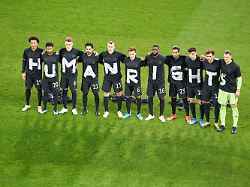“slanders”
Qatar feels exposed to ‘unprecedented campaign’
10/25/2022, 1:25 p.m
In less than a month, the soccer World Cup will start in Qatar. The event is controversial, the list of fundamental points of criticism is long, and the protests are not diminishing. The emirate sees itself treated unfairly.
The Gulf Emirate of Qatar is facing an “unprecedented campaign” in the face of ongoing criticism of the country for hosting the World Cup in a month. No host country has ever experienced anything like it, said Emir Sheikh Tamim bin Hamad al-Thani in a speech. Initially, Qatar dealt with the criticism in good faith. His country felt that some of the criticisms were useful and helped develop aspects that need to be developed, the Emir said.
“But we soon realized that the campaign was ongoing, expanding, including slander and double standards – until it reached a level of ferocity that unfortunately makes many wonder about the real reasons and motives behind this campaign,” al-Thani said.
The world football association FIFA awarded the World Cup to Qatar in 2010, which has since invested billions of dollars in the preparations. However, the Gulf state has repeatedly been sharply criticized for its treatment of foreign workers, women and queer people.
The human rights organization Human Rights Watch (HRW) raised serious allegations against the Emirate of Qatar again on Monday. HRW accuses the police in the Gulf state of arresting and abusing queer people. Between 2019 and 2022, the organization documented six cases of severe and repeated beating and five cases of sexual harassment in police custody. The last case is said to have occurred in September. The World Cup, taking place from November 20th to December 18th, is the first in an Arab country.
Reform process “a shame”
According to Wenzel Michalski, director of Human Rights Watch, the hosting role has not yet led to any significant reform processes in Qatar. He had to state “that it is a disgrace how slowly and insufficiently the reforms in Qatar are being pushed forward,” said the 59-year-old in an interview with the daily newspaper “Die Welt”.
There have been some improvements, but “mainly on paper” and “only sporadically”, Michalski criticized. There is still a lot of catching up to do when it comes to compensation payments for workers who died or were injured during the construction of the World Cup arenas: “According to the rules of the United Nations, FIFA, the government and the construction companies must compensate families whose relatives died or were injured on the construction sites. But so far, those responsible haven’t even batted an eyelid.”
FIFA had recently been a little more open to setting up a compensation fund, which DFB President Bernd Neuendorf had also called for. FIFA President Gianni Infantino recently said the World Cup in Qatar will be “the best ever”.
